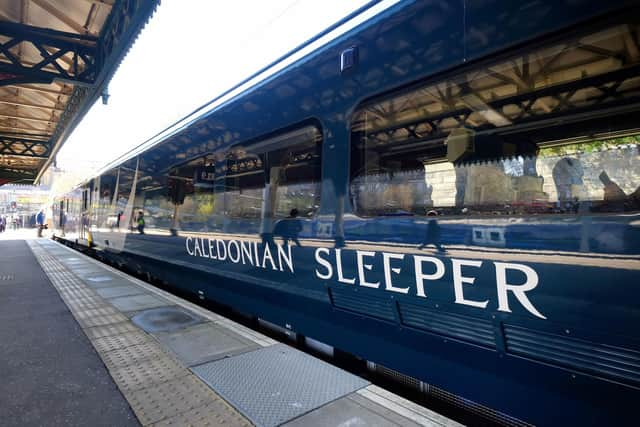Operators on track to continue sleeper service - Martin Bignell
The rail freight operator, DB Cargo, has a locomotive liveried with the words “I am the Backbone of the economy” and so it is that the sector has navigated continuous services through strike action within Network Rail and at some ports. Considerable contingency planning effort between the infrastructure provider, the freight operating companies and their customers has prioritised freight that needs to keep moving and to route trains past closed lines.
It is this demonstrable proactiveness that continues to give freight customers the confidence to continue switching from road haulage to rail freight. Upwards of 70 per cent of all Scottish rail freight moves across the border to and from UK ports and distribution hubs.
Advertisement
Hide AdAdvertisement
Hide AdThe impact and success of these flows are being recognised across our industry. At Rail Freight Group’s own awards, the partnership between Direct Rail Services and Tesco to establish the supermarket’s first refrigerated rail service between Tilbury and Coatbridge won our Driving Rail Freight Growth award, noting that reliably moving chilled produce in large quantities is a step change for rail and that the significance of shifting more than 17,000 containers per year off the road will help drive the whole chilled food market to increase its use of rail freight. Shortly after, the National Rail Awards also chose to recognise the service with their Freight and Logistics Achievement of the Year award.


Yet to win an award but no less important, another daily service started up for major logistics operator Stobart, now part of the major retail distribution company, Culina Group. It too is innovating with the use of containers that can be loaded from the side, just like a road trailer. In doing so, rail-compatible units are being integrated into existing supply chains that have warehouses, distribution centres and manufacturing facilities set up for road haulage. Simplifying the integration has enabled a daily connection for retail goods between the logistically important hubs of Doncaster and Bellshill.
One "freight” service making recent headlines in Scotland is unusual. The overnight and iconic Caledonian Sleeper is a service delivered operationally by GB Railfreight, who own and operate the locomotives and provide drivers under contract to the franchise holder.
The franchise is to be cancelled on value for money grounds although the minister recognised the franchise holder having “broadly” done a good job improving it. An odd understatement, as it has been utterly transformed for the better since being extracted from the Scotrail passenger franchise, where it had lain as an unloved and underinvested operational inconvenience for years.
The sleeper has always been delivered as a partnership between the franchise holder and rail freight company. Locomotive traction is specialised to supply the high power for unique facilities built into sleeper coaches and sleeper services are exposed to overnight engineering works, necessitating diversions that freight operators used to long distance and night-time working are better equipped to plan and manage while still reaching the end destinations on time.
Even if the sleeper is nationalised, improving value for money will be challenging. It has high fixed staff and operational costs, and revenue is capped by the number of paying guests it can carry; lengthening the train, adding more services, or increasing the number of bed spaces isn’t easy.
It’s an unusual “freight” service and private freight operating companies are very likely to continue to play a critical underpinning role in its delivery. Another example of the sector’s ability to tailor services for a wide range of customer needs.
Martin Bignell, Scottish and Northern Representative, Rail Freight Group
Comments
Want to join the conversation? Please or to comment on this article.